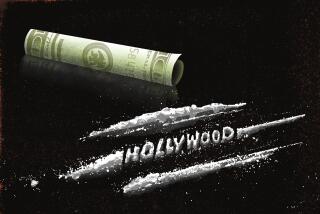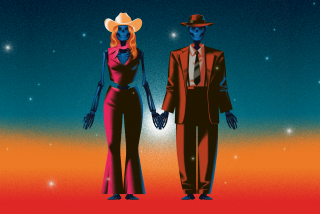‘Pawn Sacrifice’ ably follows chess master Bobby Fischer’s unraveling, move by move
- Share via
No sports fan need be reminded of the thrill of victory and the agony of defeat, but what about the agony of victory, the unraveling that can occur when your triumph is so complete there are no more worlds to conquer?
Though it oversimplifies a complex reality to put it that way, something like that seems to have happened to Bobby Fischer, considered by many to be the greatest chess player who ever lived.
Fischer gradually came apart at the seams after achieving the victory he’d dedicated his entire life to — becoming the world chess champion by defeating Boris Spassky and the impregnable Russian chess establishment in an epochal Cold War match in Reykjavik, Iceland, in 1972.
Chess may not seem like a terribly dramatic sport, but Fischer’s operatic life and the innovative, unwaveringly focused way he played the game has inspired several excellent films, including Steve Zaillian’s underappreciated “Searching for Bobby Fischer” and Liz Garbus’ completely fascinating documentary, “Bobby Fischer Against the World.”
SIGN UP for the free Indie Focus movies newsletter >>
“Pawn Sacrifice” is a solid and entertaining addition to the Fischer film canon. As written by the reliable Steven Knight (“Dirty Pretty Things,” “Locke”) and directed by the veteran Edward Zwick, the film’s straight-ahead approach matters less than the complete and utter strangeness of the true story it convincingly tells.
Similarly, while Tobey Maguire was essential in getting the film made (he joined the Gail Katz project as star and producer before either Knight or Zwick were hired), his work as the wound-way-too-tight Fischer cuts two ways.
While the actor’s unflagging energy and commitment is the film’s indispensable power source, his at-times overwrought performance will be both too crazy and not crazy enough for those who remember Fischer in his prime (he died in 2008 at age 64) or got a taste of the man in Garbus’ documentary.
But just like the real Fischer survived and prospered for a while because of his loyal support team, the nuanced work of top-notch costars Peter Sarsgaard, Liev Schreiber and Michael Stuhlbarg keeps things balanced when Maguire’s performance gets too unhinged for its own good.
“Pawn Sacrifice” begins in the middle of its story, with Fischer histrionically freaking out in a remote house in Iceland in 1972, consumed by an attack of paranoia that threatens to derail the championship match with Spassky he has worked so long to achieve.
When the film flashes back more than 20 years, to Fischer’s boyhood in Brooklyn, we see that for him paranoia was something of a birthright. His politically active mother, Regina, was a suspected Communist under FBI surveillance who taught her son “there are bad people in the world who want to intimidate us.”
When the chaos of his surroundings threatens to overwhelm, young Bobby turns to chess, a game he taught himself at age 6, playing out matches in his head to calm himself.
Hoping to discourage the boy from such frivolity by exposing him to better players, his mother takes him to a chess club, but the reverse happens. By the time he was 12, Fischer was a rising star and he became the youngest grandmaster in chess history when he was 15.
Always, his aim was to beat the Russians, the reigning monarchs of the international chess world. “I’m ready, it’s my time,” he says, but despite Fischer’s preternatural skill, the obstacles to achieving his dream are many.
A major obstruction was not only the skill of individual USSR players like Spassky and Mikhail Botvinnik but also the superior gamesmanship of the Soviet team, strategies that lone wolf Fischer denounced as “unfair, unjust, immoral” after he is denied victory in 1962’s World Team Olympics at Varna, Bulgaria.
SIGN UP for the free Essential Arts & Culture newsletter >>
At this point, like the cavalry arriving in a John Ford western, Fischer gets some much-needed help. First to arrive is Paul Marshall (“A Serious Man’s” Stuhlbarg), a successful music business attorney. The film hints that Marshall’s patriotic attempts to help Fischer dominate the Communists had a connection to the U.S. government.
Also joining the team are Father Bill Lombardy (the always compelling Sarsgaard), a top chess player who serves Fischer as a strategic sounding board and serves the film as the source of pithy remarks about the protagonist like “Bobby won’t crack, he will explode” and “without chess he doesn’t exist.”
Fischer’s laser focus soon alights on rising Russian star Spassky, especially when the two compete against each other in 1966’s Piatigorsky Cup tournament held at Santa Monica’s Miramar Hotel.
Looking coolly unflappable behind ever-present sunglasses and speaking excellent Russian, Schreiber (who also starred in Zwick’s “Defiance”) makes Spassky the perfect foil for Fischer. Especially memorable is a scene on the Santa Monica sand where the apoplectic American screams at the baffled Russian, “I’m coming after you.”
Which is exactly what Fischer does when he takes on then-world champion Spassky in the Reykjavik match that is “Pawn Sacrifice’s” dramatic centerpiece.
By this point, another obstacle in Fischer’s way has become clear: His paranoid, at times anti-Semitic delusions have gained in strength and his connection to reality has become increasingly tenuous. It seems only a matter of time before his demands derail his life.
Yet, as someone says, “out of all the craziness come games of such unimaginable beauty.” That conundrum kept the chess world in Fischer’s thrall, and makes “Pawn Sacrifice” a story we can’t turn away from.
Twitter: @KennethTuran
------------
‘Pawn Sacrifice’
MPAA rating: PG-13 for brief strong language, some sexual content and historical smoking
Running time: 1 hour, 56 minutes
Playing: Landmark, West Los Angeles
More to Read
Only good movies
Get the Indie Focus newsletter, Mark Olsen's weekly guide to the world of cinema.
You may occasionally receive promotional content from the Los Angeles Times.











